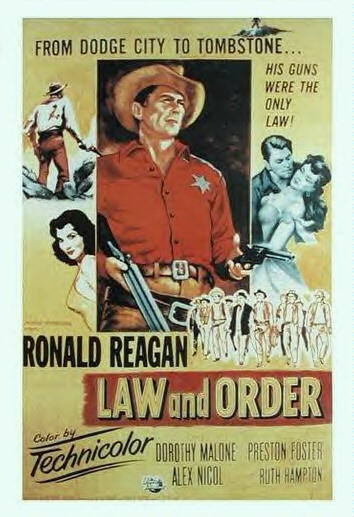The
Cowboy Myth

"You'd be surprised how
much being a good actor pays off."
--President Reagan,
responding to a question from students at Shanghai's
University of Fudan as to which experiences best prepared
him for the presidency, April 30, 1984
Ronald Reagan was not born
a cowboy; he decided to assume the role. Reagan grew up in
a non-cowboy, manufacturing town, Dixon Illinois. During his
Hollywood years, he learned to ride horses and even played a cowboy
in the western films "The Bad Man," 1941 and
"Law and Order," 1953.
When Reagan turned to
politics, in the early 1960's, he seemed to sense that a cowboy persona would benefit
him politically. To cultivate this image in the mind of the public, he
often donned cowboy boots and jeans.
In 1974, as Reagan was planning his
first presidential
bid, some of his wealthy friends bought him a ranch. During his tenure as president, he made
frequent visits to the ranch. It was here that he relaxed, staged
photo ops and did
cowboy things like: clearing brush, chopping wood, and
going for morning horseback rides.
In politics, Reagan was able to capitalize on
the romantic notion that cowboys and country folk
are straightforward and trustworthy.
However, Reagan's
"straight-shooting" cowboy persona, like so many other things about him, was
contrived. It was during the Iran-contra scandal
of 1986-87 that the public got a keen sense of Reagan's dishonesty.
(see Foreign
Policy)
In
November 1986, it was disclosed that the Reagan administration
had been bargaining with terrorists by selling arms
to Iran. Reagan went on television and vehemently
denied that any such sale had occurred. He retracted
this statement a week later, insisting that the
sale of weapons had not been an arms-for-hostages deal.
In March 1987, Reagan was forced to issue a second retraction, admitting
that the deal had been arms-for-hostages after all.
Shipping arms to Iran violated an arms
embargo against that country, and bargaining with terrorists
violated Reagan's campaign promise never to do so.
In an ABC News/Washington Post
poll taken at the time,
62% of the public said that Reagan had lied about Iran-contra.
A New York Times/CBS News poll revealed that Reagan's popularity had plummeted from 67%
to 46%--the largest one-month drop ever recorded.
With
Iran-contra, as author Mark Green wrote, "...the Reagan
era effectively came to a close. Yes, he could still
veto bills and give speeches behind the presidential seal, but
his magic spell was finally broken."
Green went on to
say, "Looking back, it was something of a miracle that
Reagan's credibility and sway survived even six years.
From day one his standard operating procedure, as illustrated
by his initial answer on arms to Iran, was a blend of
ignorance, amnesia, and dissembling. Like a panicky
passenger lunging for a life preserver, he would, under
stress, concoct almost any fact or anecdote to advance his
ideological beliefs. Ronald Reagan brought to mind Will
Roger's comment that 'It's not what he doesn't know that
bothers me, it's what he knows for sure that just ain't
so.'"
The Ronald Reagan
Years - The Real Reagan Record
by Mark Tracy
|